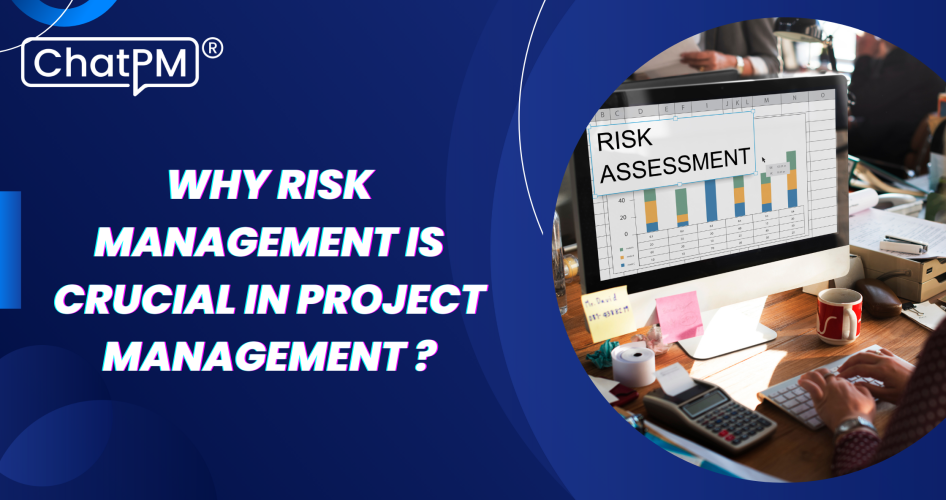Have you ever seen a project fail due to unexpected problems? What if those issues could have been avoided with the right plan in place? Risk management helps project managers identify potential challenges before they turn into major roadblocks. But why is it so important? And how can it make a difference in project success?
Risk management is an important part of project management because it helps teams find and prepare for possible problems before they happen. Every project comes with challenges, like delays, budget issues, or unexpected changes. By identifying risks early, teams can reduce delays, avoid extra costs, and keep the project on track. It also helps them take advantage of good opportunities that may come up. With proper risk management, projects run more smoothly, teams work with more confidence, and goals are achieved with fewer surprises.
Let’s explore why risk management is a crucial part of project management!
Importance of Risk Management in Project Management
a. Improve decision-making
Risk management enables teams to make better decisions by identifying potential project difficulties and opportunities. Teams that thoroughly analyze risks may plan ahead and take the right steps to keep the project on track. They can plan ahead of time to solve difficulties rather than reacting at the last minute. For example, if there is a possibility of a budget problem, the team can investigate methods to save money or modify the plan before it becomes a major issue. Similarly, if there is a chance to improve the project, they can do it without delay. Knowing what dangers to expect can help teams avoid mistakes, decrease stress, and increase their chances of success. Good risk management makes teams more confident in their decisions, work more efficiently, and complete projects with fewer surprises. In short, understanding risks leads to smarter and smoother project management.
b. Enhanced communication
Effective risk management promotes communication among all project stakeholders. When identifying and addressing risks, teams must exchange essential data with one another, stakeholders, and project sponsors. This open communication keeps everyone aware of potential difficulties and the efforts being made to address them. By communicating risks early on, misconceptions can be avoided, and team members can collaborate to discover the best solutions. It also fosters trust since everyone understands the project is being properly handled. If an issue emerges, clear communication ensures that the appropriate individuals respond promptly. Regular risk talks also help teams keep focused on project objectives and expectations. When everyone is on the same page, decision-making is simplified, and projects operate more smoothly. In brief, risk management encourages better teamwork, stronger collaboration, and more successful project outcomes.
c. Prevent major issues
Risk management helps to avoid severe issues by detecting potential obstacles early in the project. When project managers identify risks ahead of time, they can take proactive steps to minimize problems such as budget overruns, missed deadlines, and poor-quality outcomes. For example, if there is a chance of a timetable delay, the team might change the timeframe or assign extra workers to keep things on track. If expenditure exceeds budget, they can investigate strategies to minimize spending or seek more funds before the situation becomes severe. Teams that plan ahead of time can handle hazards more smoothly than those who are caught off guard. Preventing big challenges also leads to improved project outcomes since teams can focus on producing high-quality work without feeling stressed. So, risk management enables initiatives to stay within budget, on schedule, and meet expectations, making success more achievable.
d. Increase project success rate
Project success is dependent on effective risk management. By recognizing and addressing risks early on, project managers can keep the project on track, staying under budget and meeting deadlines. Teams can prevent costly mistakes, delays, and unanticipated hurdles by addressing prospective issues ahead of time. For example, if a project is at risk of running out of resources, managers can plan ahead to obtain what is required before it impedes development. If there is a risk of missing a deadline, they can alter timetables or allocate extra personnel to avert delays. Active risk management allows teams to operate more effectively, make better decisions, and complete projects with fewer disruptions. This results in increased success rates, pleased stakeholders, and a more efficient overall workflow. So, risk management helps projects finish on time, within budget, and with the expected quality.
Also Read: Revolutionizing Project Management with ChatGPT: Your AI Assistant for Success
e. Resource optimization
Resource optimization is a significant advantage of successful risk management. When project teams identify and analyze risks, they can concentrate on those that have the greatest potential effect. This enables them to focus resources where they are most needed, ensuring that the most pressing concerns are handled first. For example, if there is a risk that might result in a significant delay or cost increase, the team can devote more time, money, or effort to preventing or mitigating it. Teams save resources by focusing on the most significant threats. This method improves project efficiency by allowing teams to make the greatest use of existing resources while avoiding excessive spending. Finally, effective risk management leads to smoother project execution and better results, all while keeping resources focused on what really matters.
Risk management is essential for keeping projects on track, preventing issues, and ensuring successful outcomes. By identifying potential challenges early, making informed decisions, improving communication, and optimizing resources, teams can increase their chances of delivering projects on time, within budget, and to the desired quality.
Ready to improve your project management skills? Harness the power of risk management for more successful projects and smoother execution.
Start managing risks effectively today!







